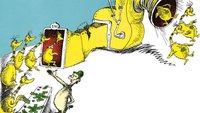I posted this a while ago on the mtb race forum; apologies to those who are re-reading as a result.
what is doping?
All the hullabaloo over Floyd Landis has brought cycling into the public eye again but not in a good way. It got me thinking about doping and where the future of the sport is headed. Not to mention other sports that also have problems with it.
What is doping? Using a substance to enhance athletic performance (Wikipedia). Why is that considered cheating? The substances are readily available, it would seem, available to all who wish to use them. Some are banned because they are considered to be detrimental to an athletes' health, long-term or otherwise. (But there is little research on the matter, largely because of the illegal status of the drugs - so how do we know for sure?). Others are banned for what would seem moral reasons, like alcohol and marijuana. Hard to see why any athlete in competition would want to crack a beer or hit a joint, but banned they are. I guess there's a safety angle there, I wouldn't want to be on the same playing field as someone who was drunk or stoned.
Why is the use of banned substances considered cheating? It's commonly believed that using a drug is some kind of short cut that replaces hard work and training. Skip that 5 hour training ride and just pop some pills instead, you'll be faster anyway. Another theory says that using prescription drugs for a purpose other than that for which they were developed is wrong and dangerous. I'd say, good point, don't mess with pharmaceuticals because of unforeseen consequences. But just because a drug company had one outcome in mind doesn't mean that other applications for a drug can't be legitimate too. Bayer released Aspirin over 100 years ago as a headache pill, but these days millions of the things are prescribed by doctors as a precaution against heart disease. Where's the problem with that?
My issue comes with the banning of some products and not others. Steroids are illegal, protein supplements are not (and some companies produce both kinds of products in the same facility…). Amphetamines are not OK, recovery drinks and energy drinks are. What's the difference? All promise better performance through chemistry rather than training. Why is EPO banned when altitude tents are not? Both have the same result (elevated red cell counts and improved aerobic fitness) but one method of getting there is illegal whilst the other is acceptable to authorities. Neither method of itself involves 'hard work' or training; hell, the legal route actually works while the athlete is sleeping!
There doesn't always seem to be a lot of logic applied here. Drugs are demonized as a short cut, but there are many substances that are banned despite their legitimate medical uses. Most elite athletes won't take over-the-counter cough and cold medications because many contain banned substances. Only a few years ago, a Tour de France rider was forced to retire from the race because of an allergic reaction to a wasp sting that swelled up his face to the point where he couldn't see properly. He could have taken medication that would have enabled him to continue, but it also contained banned substances and he would have been thrown out of the race and suspended for a year as well. What the ???? Pray we never see the day when a racer is seriously injured and urgently needs a blood transfusion but has to get a special exemption from WADA first.
The so-called 'war on doping' approach that WADA is waging is doomed to failure because there isn't a clear line between cheating and fair play. Part of any sport is knowing the rules and pushing right to the limit, and athletes will always seek new ways to win. Sporting authorities continue to utilise new tests and ban new substances, but it smacks of moving the goalposts, albeit after a goal is scored. Athletes are locked in a three-way battle: against their peers for athletic supremacy, and against doping authorities and their arbitrary pronouncements of illegality. What a needless waste of energy.
3 ways to proceed:
Ban all substances other than food and methods other than training and hard work. Employ an army of thousands to enforce this.
Continue as usual. Endure the ongoing uncertainty and suspicion. Employ an army of hundreds to enforce the patchwork of rules and overlapping jurisdictions.
Allow all substances. Implement research on long-term health effects. Employ dozens in an education campaign concerning the harmful effects of drugs taken without medical supervision (like we do now with smoking)
Routes 1 and 2 don't make much sense. That leaves route 3 which seems awfully raw to me. Can anyone see a route 4?
Just because you can, doesn't mean you should.







